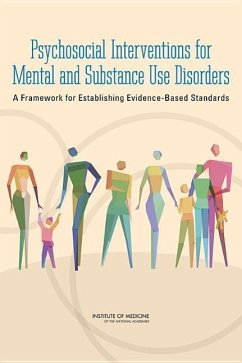Mental health and substance use disorders affect approximately 20 percent of Americans and are associated with significant morbidity and mortality. Although a wide range of evidence-based psychosocial interventions are currently in use, most consumers of mental health care find it difficult to know whether they are receiving high-quality care. Although the current evidence base for the effects of psychosocial interventions is sizable, subsequent steps in the process of bringing a psychosocial intervention into routine clinical care are less well defined. Psychosocial Interventions for Mental and Substance Use Disorders details the reasons for the gap between what is known to be effective and current practice and offers recommendations for how best to address this gap by applying a framework that can be used to establish standards for psychosocial interventions. The framework described in Psychosocial Interventions for Mental and Substance Use Disorders can be used to chart a path toward the ultimate goal of improving the outcomes. The framework highlights the need to (1) support research to strengthen the evidence base on the efficacy and effectiveness of psychosocial interventions; (2) based on this evidence, identify the key elements that drive an intervention's effect; (3) conduct systematic reviews to inform clinical guidelines that incorporate these key elements; (4) using the findings of these systematic reviews, develop quality measures - measures of the structure, process, and outcomes of interventions; and (5) establish methods for successfully implementing and sustaining these interventions in regular practice including the training of providers of these interventions. The recommendations offered in this report are intended to assist policy makers, health care organizations, and payers that are organizing and overseeing the provision of care for mental health and substance use disorders while navigating a new health care landscape. The recommendations also target providers, professional societies, funding agencies, consumers, and researchers, all of whom have a stake in ensuring that evidence-based, high-quality care is provided to individuals receiving mental health and substance use services.
Hinweis: Dieser Artikel kann nur an eine deutsche Lieferadresse ausgeliefert werden.
Hinweis: Dieser Artikel kann nur an eine deutsche Lieferadresse ausgeliefert werden.








